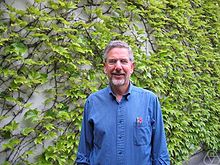Kenneth Brown (mathematician)
Kenneth S. Brown | |
|---|---|
 Kenneth Brown at Oberwolfach in 2004 | |
| Born | 1945 (age 79–80) |
| Academic background | |
| Alma mater | |
| Thesis | Abstract Homotopy Theory and Generalized Sheaf Cohomology (1971) |
| Doctoral advisor | Daniel Quillen |
| Academic work | |
| Discipline | Mathematics |
| Institutions | Cornell University |
| Doctoral students | Susan Hermiller David Webb |
Kenneth Stephen Brown (born 1945) is a professor of mathematics emeritus who spent his career at Cornell University, working in category theory and cohomology theory as well as in buildings. Among other things, he is known for Ken Brown's lemma in the theory of model categories.[1] He is also the author of the book Cohomology of Groups (Graduate Texts in Mathematics 87, Springer, 1982).[2][3]
Brown grew up in University City, Missouri, outside St. Louis, and graduated from University City High School in 1963.[4] Using a National Merit Scholarship, he attended Stanford University,[4] graduating from there in 1967 with an A.B. degree.[5] Brown earned his Ph.D. in 1971 from the Massachusetts Institute of Technology, under the supervision of Daniel Quillen, with thesis Abstract Homotopy Theory and Generalized Sheaf Cohomology.[6]
Hired by Cornell University in 1971, Brown started as an assistant professor.[5] Courses that Brown taught in his early years there included "Calculus [IV]", "Linear Algebra", and "Algebra and Number Theory".[7] Brown became an associate professor in 1976 and a full professor in 1981.[5] He served as chair of the mathematics department at Cornell beginning in 2002,[8] and concluding in 2006.[9] He also directed the Summer Math Institute in 2009.[10]
He was an invited speaker at the International Congress of Mathematicians in 1978 in Helsinki.[11] In 2012 he became a fellow of the American Mathematical Society.[12]
Known for his teaching, at Cornell Brown received the college-wide Clark Teaching Award and also the Mathematics Department Senior Faculty Award.[10] An October 2010 conference entitled "Approaches to Group Theory" was held in his honor at Cornell.[13] It was organized by his colleagues and former students, and led by the mathematicians Susan Hermiller, John Meier, Karen Vogtmann, and David Webb.[13] Brown became a professor emeritus at Cornell in 2014.[5]
Selected publications
- Cohomology of Groups, Graduate Texts in Mathematics 87, Springer-Verlag, New York, 1982 [reprinted including corrections, 1994]
- Buildings, Springer-Verlag, New York, 1989 [reprinted 1998]
- Buildings: Theory and Applications, Graduate Texts in Mathematics 248, Springer, New York, 2008 [co-author with Peter Abramenko]
References
- ^ Hovey, Mark (2007), Model Categories, Mathematical surveys and monographs, vol. 63, American Mathematical Society, p. 6, ISBN 9780821843611.
- ^ Review of Cohomology of Groups by Ross Staffeldt (1983), MR0672956.
- ^ Gruenberg, K. W. (1984). "Review: Cohomology of Groups by Kenneth S. Brown". Bulletin of the American Mathematical Society. New Series. 11 (1): 240–244. doi:10.1090/s0273-0979-1984-15284-4.
- ^ a b "On Stanford U. Dean's List". St. Louis Post-Dispatch. October 7, 1964. p. 8W – via Newspapers.com.
- ^ a b c d "Curriculum Vitae: Kenneth S. Brown" (PDF). Department of Mathematics, Cornell University. Retrieved November 3, 2024.
- ^ Kenneth Stephen Brown at the Mathematics Genealogy Project
- ^ Cornell University Announcements: College of Arts and Sciences, 1973–74. Cornell University. July 16, 1973. pp. 129, 131, 133.
- ^ "Letter From The Chair, Kenneth S. Brown" (PDF). Math Matters. Department of Mathematics, Cornell University. November 2002. p. 1.
- ^ "Letter From The Chair, Dan M. Barbasch" (PDF). Math Matters. Department of Mathematics, Cornell University. November 2006. p. 1.
- ^ a b Glaser, Linda (October 27, 2010). "Ken Brown mirrors the changing face of mathematics". Cornell Chronicle. Cornell University.
- ^ "ICM Plenary and Invited Speakers", International Mathematical Union, retrieved 2018-07-08
- ^ "List of Fellows of the American Mathematical Society", American Mathematical Society, retrieved 2013-11-16.
- ^ a b "Approaches to Group Theory: Using Algebraic, Analytic, and Geometric Tools in the Study of Groups". Department of Mathematics, Cornell University. Retrieved November 20, 2024.
